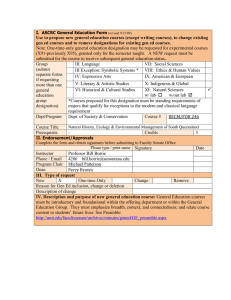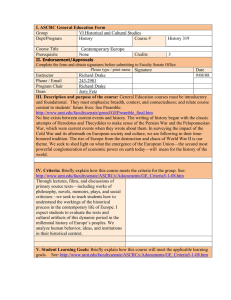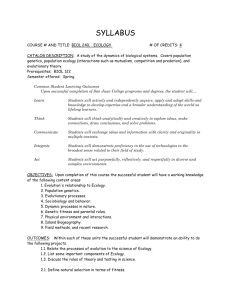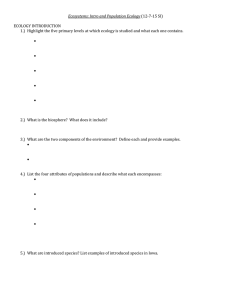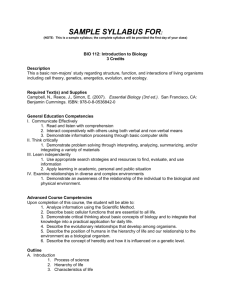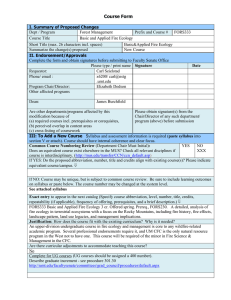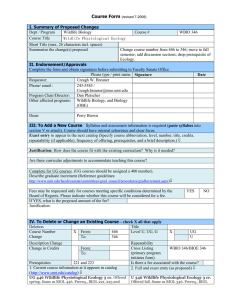I. ASCRC General Education Form Group Natural Science Dept/Program
advertisement
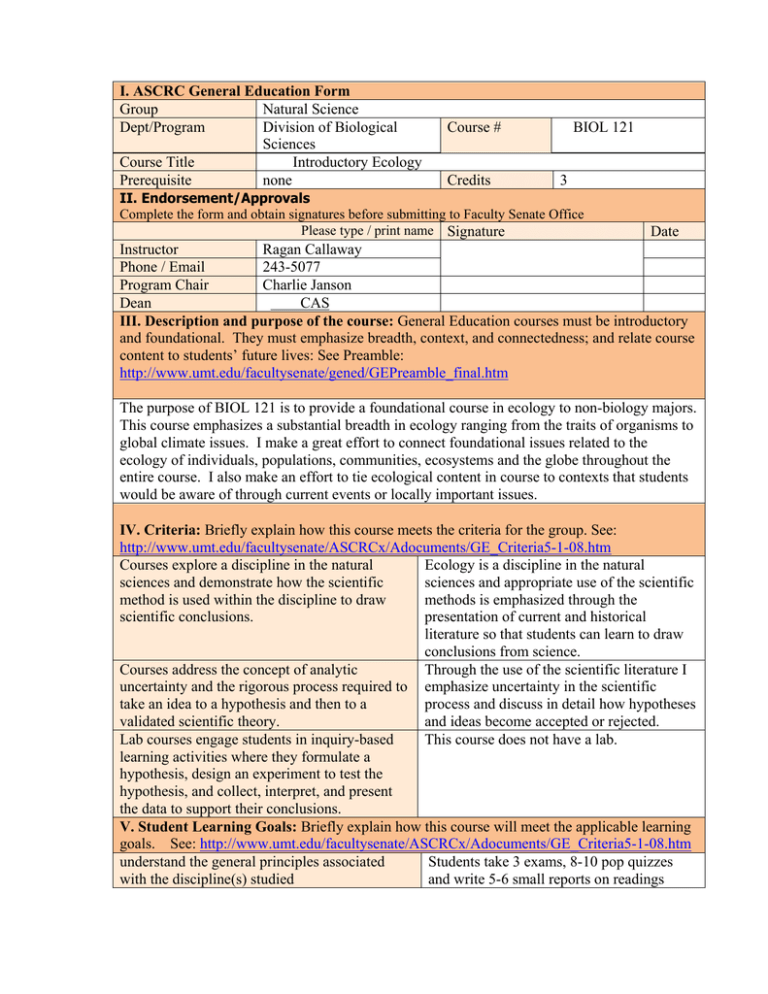
I. ASCRC General Education Form Group Natural Science Dept/Program Division of Biological Sciences Course Title Introductory Ecology Prerequisite none Course # Credits BIOL 121 3 II. Endorsement/Approvals Complete the form and obtain signatures before submitting to Faculty Senate Office Please type / print name Signature Date Instructor Ragan Callaway Phone / Email 243-5077 Program Chair Charlie Janson Dean CAS III. Description and purpose of the course: General Education courses must be introductory and foundational. They must emphasize breadth, context, and connectedness; and relate course content to students’ future lives: See Preamble: http://www.umt.edu/facultysenate/gened/GEPreamble_final.htm The purpose of BIOL 121 is to provide a foundational course in ecology to non-biology majors. This course emphasizes a substantial breadth in ecology ranging from the traits of organisms to global climate issues. I make a great effort to connect foundational issues related to the ecology of individuals, populations, communities, ecosystems and the globe throughout the entire course. I also make an effort to tie ecological content in course to contexts that students would be aware of through current events or locally important issues. IV. Criteria: Briefly explain how this course meets the criteria for the group. See: http://www.umt.edu/facultysenate/ASCRCx/Adocuments/GE_Criteria5-1-08.htm Ecology is a discipline in the natural Courses explore a discipline in the natural sciences and appropriate use of the scientific sciences and demonstrate how the scientific methods is emphasized through the method is used within the discipline to draw scientific conclusions. presentation of current and historical literature so that students can learn to draw conclusions from science. Through the use of the scientific literature I Courses address the concept of analytic uncertainty and the rigorous process required to emphasize uncertainty in the scientific take an idea to a hypothesis and then to a process and discuss in detail how hypotheses validated scientific theory. and ideas become accepted or rejected. Lab courses engage students in inquiry-based This course does not have a lab. learning activities where they formulate a hypothesis, design an experiment to test the hypothesis, and collect, interpret, and present the data to support their conclusions. V. Student Learning Goals: Briefly explain how this course will meet the applicable learning goals. See: http://www.umt.edu/facultysenate/ASCRCx/Adocuments/GE_Criteria5-1-08.htm Students take 3 exams, 8-10 pop quizzes understand the general principles associated with the discipline(s) studied and write 5-6 small reports on readings understand the methodology and activities scientists use to gather, validate and interpret data related to natural processes Substantial effort is made in class to go through the importance of appropriate experimental design, controls, and appropriate interpretation. Assessment of this is part of the examination process. detect patterns, draw conclusions, develop This is a lecture course, but proceeds in each conjectures and hypotheses, and test them by class period through Socratic questionappropriate means and experiments response-based investigation of patterns, hypotheses, experimental tests, and interpretation. understand how scientific laws and theories are In ecology there are not many laws, but the verified by quantitative measurement, scientific entire course is based on how ecologists observation, and logical/critical reasoning explore hypotheses and ideas through observations, measurements, experiments, and logical interpretation of data. VII. Syllabus: Paste syllabus below or attach and send digital copy with form. ⇓ The syllabus should clearly describe how the above criteria are satisfied. For assistance on syllabus preparation see: http://teaching.berkeley.edu/bgd/syllabus.html Introductory Ecology (BIOL 121) Ray Callaway Botany Annex 106B ray.callaway@mso.umt.edu x5077 Fall, 2006 Office Hours Mon 2-4 August 29 & 31..……..……………………………………….….Introduction & climate September 5* & 9*………………………………...…………….climate September 12 & 14……………………………………………….adaptations September 19 & 21……………………………………………….adaptations September 26 & 28……………………………………………….populations October 3*…..…………………………………….………………populations October 5………………………………………………………….EXAM October 10 & 12…….……………..…………………………......populations October 17* & 19…..…………………………..………………...communities, competition October 24 & 26…..……………………………………………...communities, allelopathy October 31……………………………………………………….. communities, predation November 2…….………………………………………………...communities, mutualism November 7……………………………………………………… HOLIDAY November 9..……………………………………………………...EXAM November 14 & 16……………………………………………….ecosystems November 21…..………………………………………………….ecosystems November 23…..…………………………………………………THANKSGIVING November 28* & 30……….……………………………………..ecosystems December 5 & 7………………………………………………….global change & REVIEW December 14 (3:20-5:20)………………………………………...FINAL Grade is based on two midterms (100 points each), the final (200 points), quizzes in class (5070 points), and five reading-writing assignments (50 points plus 10 extra credit). All of these are based on multiple choice and short answer questions. The quizzes provide opportunity for evaluation prior to 30 instructional days into the semester. P/NP the minimum achievement for a P will be a C grade. With proof of remedial or personal need, makeup exams will be allowed. Only students registered with DSS will be considered for disability accommodation. Requests to drop courses or change the grade basis of a course during the last few days of the semester will be evaluated strictly based on University of Montana policy. No finals will be given before the date listed above. *Please note: As an instructor of a general education course, you will be expected to provide sample assessment items and corresponding responses to the Assessment Advisory Committee.
